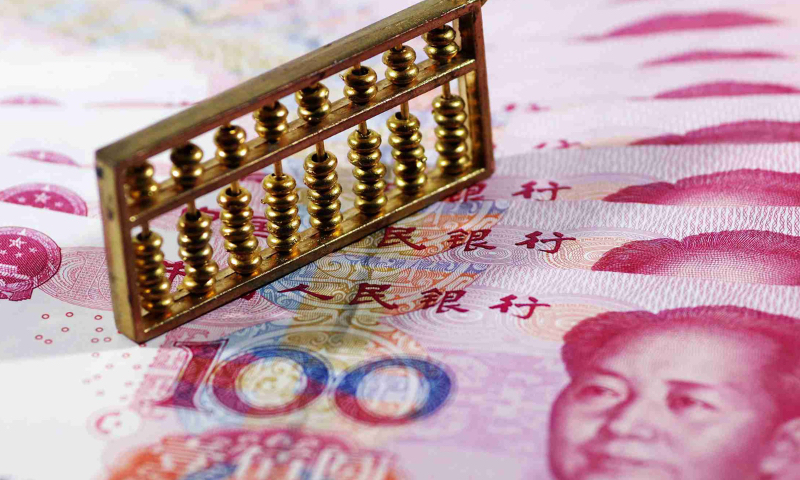Not every companies wanted to decouple from China.
Panasonic had been quite "pro-China", back in 1989 they pretty much bucked the trend and invested in China after the Tiananmen incident.
China’s yuan strengthens against US dollar on bullish economic recovery outlook
RMB gains 4,500 basis points since Nov
By Qi Xijia Published: Jan 06, 2023 11:14 PM
yuan Photo: CFP
China's yuan strengthened against the greenback on Friday on investor optimism that recent policy support measures and reopening will bolster an economic recovery in China in 2023.
The onshore yuan closed at 6.8588 to the US dollar on Friday, 143 basis points stronger from the previous close. The People's Bank of China (PBC), the central bank, set the midpoint rate at 6.8912 per US dollar prior to the market open on Friday, 14 basis points stronger from the previous fix of 6.8926.
The Chinese yuan has been on an appreciation trend in the past few months with the onshore yuan strengthening from a low of 7.328 per US dollar in early November to 6.8588 this week, a gain of more than 4,500 basis points.
In order to promote the development of the foreign exchange market, the PBC and the State Administration of Foreign Exchange (SAFE) from Tuesday extended the trading hours of the inter-bank foreign exchange market to 3 am the next day, covering more trading hours in Asian, European and North American markets.
The move is the latest one aimed at promoting the coordinated development of onshore and offshore foreign exchange markets, providing more convenience for global investors, and further enhancing the attractiveness of yuan assets, according to the officials.
The yuan gains are supported by the improved market sentiment on China's economic growth in 2023, as the impact of the epidemic on economic recovery weakened, and economic and social life has gradually returned to the right track, analysts said.
The most important driver of the redback comes from China itself, as the market feels greater optimism over prospects for a domestic economic recovery, Zhou Maohua, an economist at Everbright Bank, told the Global Times on Friday.
With the optimized epidemic measures, reduced restrictions on economic activities and the implementation of a package of policy measures, consumer demand will pick up significantly, becoming the first engine of growth in China, Zhou noted.
In contrast to recessions in the US and Europe, China could revive consumer and service activity in the second half of 2023, according to a report issued by the Standard Chartered Wealth Management Chief Investment Office (CIO) in its Outlook 2023 report sent to the Global Times.
With the continuous optimization and adjustment of the epidemic prevention and control measures, Chinese residents' travel and offline consumption gradually increased during the New Year's Day holiday, the Ministry of Commerce (MOFCOM) said on Friday.
Demand for inter-provincial and long-distance travel has increased significantly, hotel occupancy and booking rates in popular tourist destinations have continued to rise, and the operating rate of cinemas across the country reached 85 percent, a 10-month high, according to MOFCOM.
In a fresh move to stabilize the economy, PBC on Wednesday said it would continue to step up financing support to spur domestic consumption and key investment projects and support a stable real estate market.
In 2023, the yuan exchange rate is poised to have a friendlier environment and continue to operate at a reasonable and balanced level, given the sound domestic economic outlook against gloomy economic prospects in the US, Zhou said.
The more certain recovery trend of domestic economic demand will increase the attractiveness of yuan assets. On the other hand, the end of the Fed's interest rate hike cycle, coupled with slowing economic growth in the US, restricted the dollar's attractiveness, Zhou said.
The yuan is expected to have room to appreciate against the dollar in 2023 on hopes of China's economy recovering significantly, Dong Dengxin, Director of the Finance and Securities Institute of the Wuhan University of Science and Technology, told the Global Times on Friday.
Overseas investors have been seen snapping up A-shares in 2023 recently, seeking a safe haven for international capital, which also paved the way for the yuan's rally, Dong said.
Overseas institutions are increasingly bullish on yuan assets in anticipation of China's economic recovery, and cross-border capital inflows are also on the rise.
As of Friday close, the net inflow of northbound trading hit 6.066 billion yuan ($880 million) on the trading day. The first four trading days in 2023 have seen net inflow of northbound funds hit 20 billion yuan.
Shanghai Composite Index gained 0.08 percent while Shenzhen Component Index closed 0.32 percent higher on Friday.

